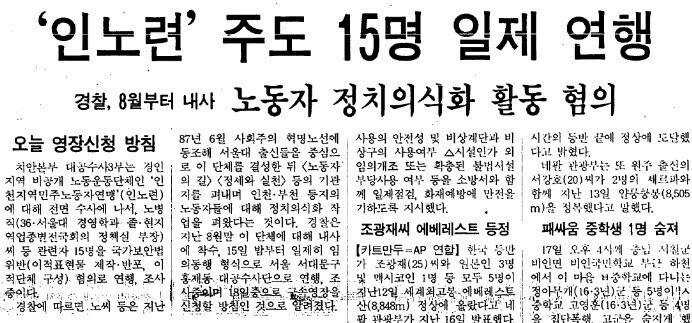hankyoreh
Links to other country sites 다른 나라 사이트 링크
[Editorial] Shady past of police bureau’s new leader

As the Yoon Suk-yeol administration pushes ahead with the establishment of a new “police bureau” under the Ministry of the Interior and Safety in spite of controversy over the move’s legality and constitutionality, it has been revealed that the top dog at the bureau entered the police as part of “special anti-communist hiring” directly after cutting ties with a labor activist group in the 1980s.
Furthermore, at a time when the government faces strong criticism that the bureau will serve as a tool for police to seize control of power, the appointment of a man who conjures up images of brutal suppression of democracy and shady maneuvers during the era of the National Security Headquarters under the Ministry of Home Affairs is highly inappropriate in any circumstances.
Reporting by the Hankyoreh and other media shows that Kim Sun-ho, the inaugural chief of the new police bureau, was hired as a senior patrol officer in August 1989 in a kind of special recruitment for “persons involved in anti-communist work.” He was initially deployed to the third unit of the National Security Headquarters’ anti-communist investigations division, known as the “Hongje neighborhood anti-communist office.” Kim worked in this field until 1998, when he was promoted to senior inspector.
Prior to joining the police force, Kim had played a pivotal role in the Incheon and Bucheon Democratic Workers Association (IBDWA) which formed in February 1988 before suddenly disappearing in April the following year. Four months later, he was put in charge of police work in relation to the very field he had previously been involved in.
Around the time that Kim went missing, 15 members of the IBDWA were rounded up one by one, effectively dismantling the organization. The Hongje neighborhood anti-communist office where Kim went on to work is the same location where Choi Dong, who set himself on fire in 1990 due to lingering effects of torture suffered during an investigation over IBDWA activities in 1989, was detained. Those who were around Kim in the 1980s say they grew suspicious of his actions around this time. In other words, they suspect he became a police informer and was hired as an anti-communist agent.
When reached for comment, Kim told the Hankyoreh that the allegations are “nothing more than absurd speculation” and he “has never used any such information in an investigation.” He went on to say that the IBDWA activists “were not involved in the labor movement,” claiming they were instead “proponents of Juche ideology.” Kim said that the movement “should not be glamorized or painted as democratic.”
However, at an event held on Sunday marking the 32nd anniversary of Choi Dong’s death, those connected to the IBDWA incident demanded “a detailed explanation of Kim’s suspicious past and a sincere response to the allegations made by members.”
Kim is in no position to pass judgment on the activities of the IBWDA. Even if he was not directly involved, as the inaugural chief of the police bureau in a situation marred by controversy over a police power grab, it stands to reason that he should apologize to those who suffered from police brutality including torture and unjust arrests in that era. Minister of the Interior and Safety Lee Sang-min should conduct a thorough investigation into Kim’s past and go back to square one in considering his suitability for the position.
Please direct questions or comments to [english@hani.co.kr]

Editorial・opinion
![[Column] Life on our Trisolaris [Column] Life on our Trisolaris](https://flexible.img.hani.co.kr/flexible/normal/500/300/imgdb/original/2024/0505/4817148682278544.jpg) [Column] Life on our Trisolaris
[Column] Life on our Trisolaris![[Editorial] Penalties for airing allegations against Korea’s first lady endanger free press [Editorial] Penalties for airing allegations against Korea’s first lady endanger free press](https://flexible.img.hani.co.kr/flexible/normal/500/300/imgdb/original/2024/0502/1817146398095106.jpg) [Editorial] Penalties for airing allegations against Korea’s first lady endanger free press
[Editorial] Penalties for airing allegations against Korea’s first lady endanger free press- [Editorial] Yoon must halt procurement of SM-3 interceptor missiles
- [Guest essay] Maybe Korea’s rapid population decline is an opportunity, not a crisis
- [Column] Can Yoon steer diplomacy with Russia, China back on track?
- [Column] Season 2 of special prosecutor probe may be coming to Korea soon
- [Column] Park Geun-hye déjà vu in Yoon Suk-yeol
- [Editorial] New weight of N. Korea’s nuclear threats makes dialogue all the more urgent
- [Guest essay] The real reason Korea’s new right wants to dub Rhee a founding father
- [Column] ‘Choson’: Is it time we start referring to N. Korea in its own terms?
Most viewed articles
- 1New sex-ed guidelines forbid teaching about homosexuality
- 2OECD upgrades Korea’s growth forecast from 2.2% to 2.6%
- 3[Column] Life on our Trisolaris
- 460% of young Koreans see no need to have kids after marriage
- 5[Guest essay] Maybe Korea’s rapid population decline is an opportunity, not a crisis
- 6Inside the law for a special counsel probe over a Korean Marine’s death
- 7Korean government’s compromise plan for medical reform swiftly rejected by doctors
- 8Months and months of overdue wages are pushing migrant workers in Korea into debt
- 9Two lung cancer deaths at Samsung Electronics deemed occupational in nature
- 10Trump asks why US would defend Korea, hints at hiking Seoul’s defense cost burden